Key takeaways:
- Vaccine anxiety is a common emotional response, often stemming from personal experiences and misinformation.
- Vaccines are crucial for public health, providing community immunity and eradicating diseases.
- Understanding vaccine misconceptions, such as DNA alteration and microchips, can empower informed health decisions.
- Strategies like education, sharing feelings, and relaxation techniques can help overcome vaccine-related fears.
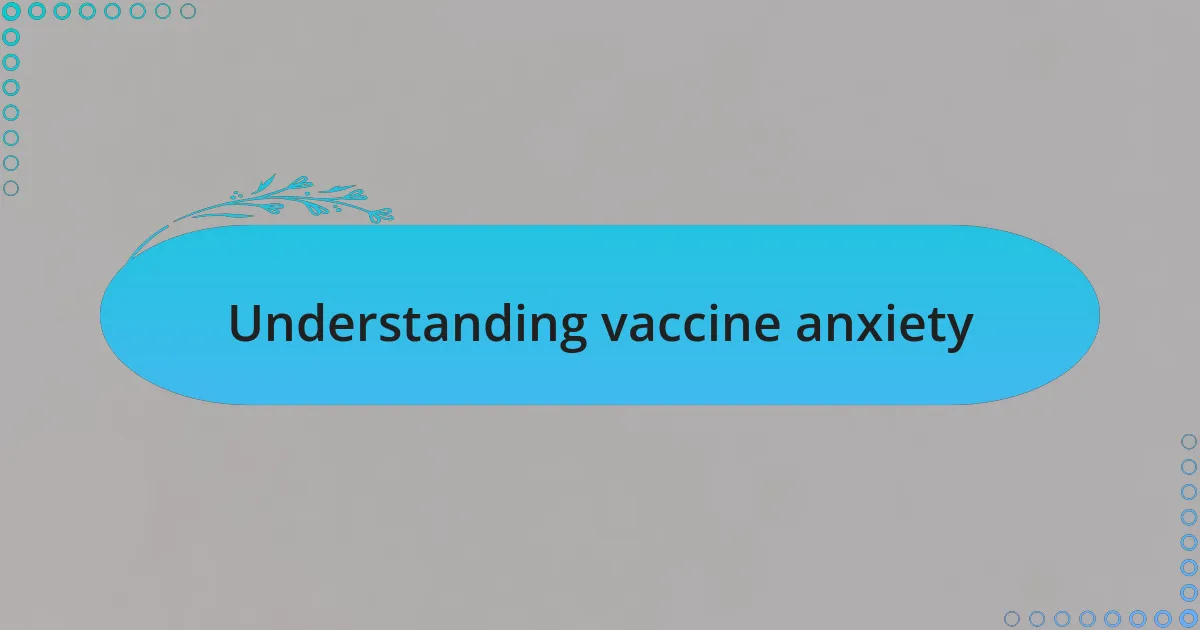
Understanding vaccine anxiety
Vaccine anxiety is a complex emotional response that many people experience when contemplating vaccination. I remember feeling a tight knot in my stomach as the date for my vaccine appointment approached. It’s fascinating how our minds can race with “What if?” scenarios, often fueled by stories shared around us or misinformation that infiltrates our consciousness.
I often wondered, why does this fear grip us so tightly? For some, it can stem from past experiences with needles or a fear of medical settings. Reflecting on a friend who fainted during a routine blood draw, I realized how these individual experiences can shape our perceptions and reactions to vaccines in profound ways.
It’s important to recognize that these feelings are valid and shared by many. By discussing our fears openly, we can create a supportive community. When I finally talked to others about my anxiety, it was eye-opening to discover how common these feelings were, creating a sense of camaraderie that made the journey feel a bit less daunting.
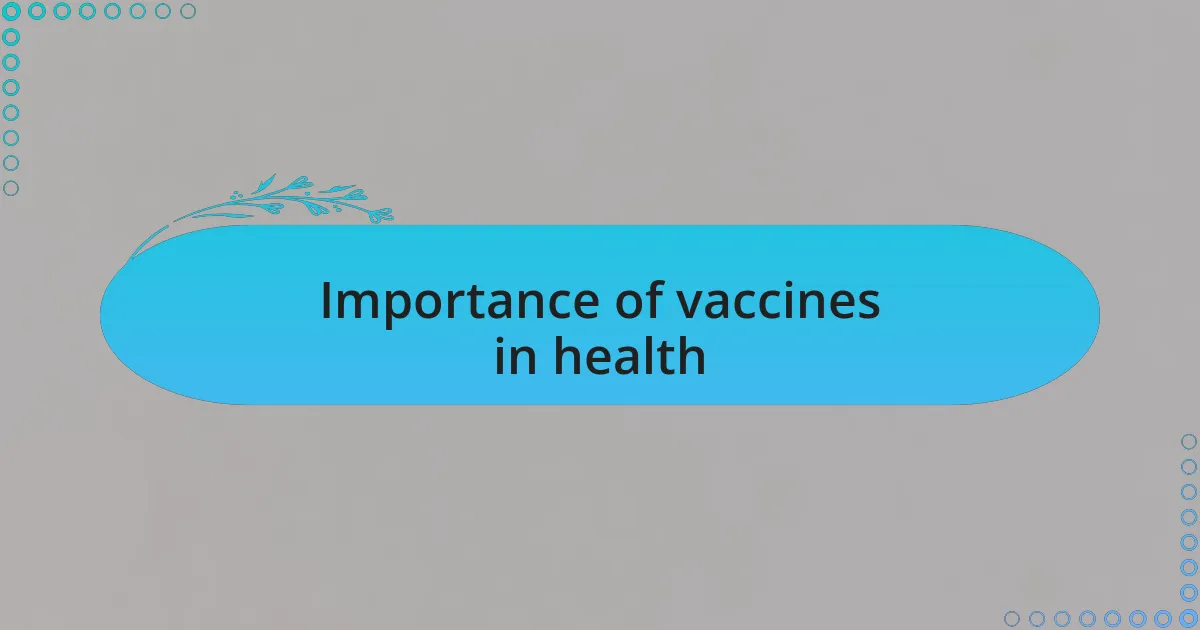
Importance of vaccines in health
Vaccines play a crucial role in safeguarding public health and preventing the spread of infectious diseases. For example, when I received my flu shot last year, it felt empowering to know that I was not just protecting myself but also those around me, especially vulnerable populations like the elderly or immunocompromised individuals. Isn’t it incredible how a simple jab can contribute to community immunity?
Consider the impact of childhood vaccinations. I remember vividly my niece’s series of vaccinations. Her mom was understandably nervous, but witnessing the joy of a healthy child growing up free from diseases that once plagued generations was a powerful reminder of the incredible strides we’ve made in medicine. The thought that vaccines helped eradicate diseases like smallpox and significantly reduced instances of polio showcases their life-saving potential.
The significance of vaccines extends beyond individual protection; it’s about building a healthier future for all. Sometimes, I find myself contemplating the global effort it takes to vaccinate populations, especially during pandemics. If we can overcome misinformation and embrace this path together, what heights could we reach in improving overall health? Reflecting on this, I can’t help but feel a surge of hope for what lies ahead, as vaccines continue to be a pivotal tool in our health toolkit.
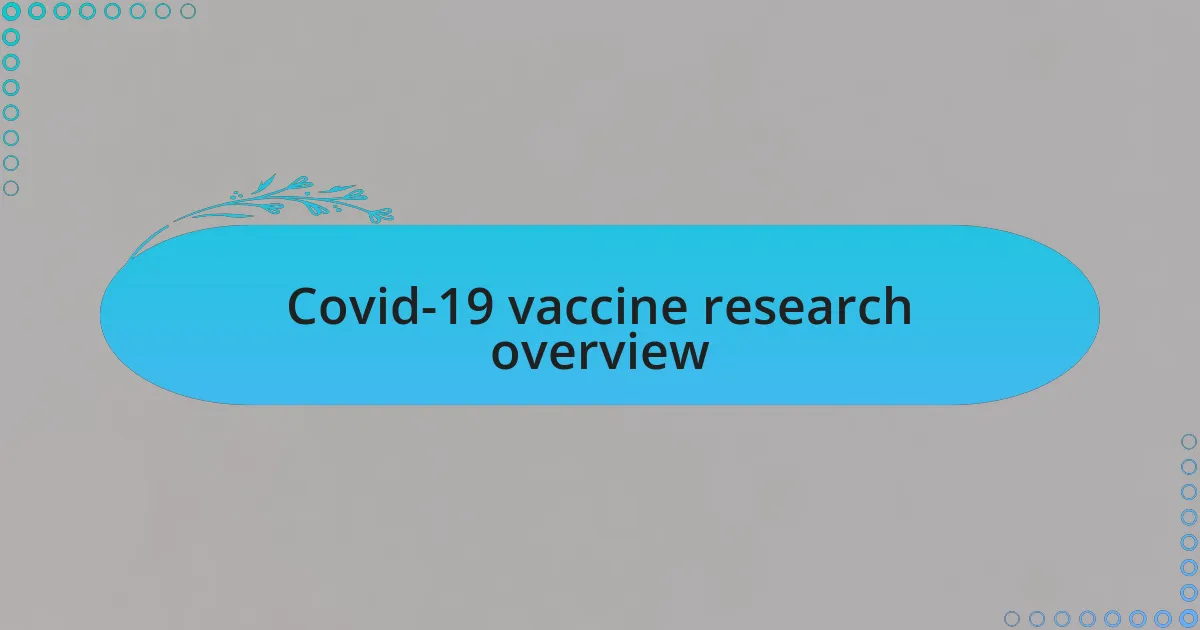
Covid-19 vaccine research overview
The research behind COVID-19 vaccines has been nothing short of revolutionary. When I first learned about the rapid development of mRNA vaccines, it felt like science fiction coming to life. To think that scientists could create a vaccine in record time by using a new technology was both thrilling and reassuring. Why had we not harnessed this potential sooner?
Diving deeper into the data, I found it fascinating how clinical trials included diverse groups to ensure the vaccine’s effectiveness across different demographics. It reminded me of a family gathering where each of us brought our unique stories to the table. Every participant in those trials was contributing to the broader understanding of vaccine safety and efficacy. Can you imagine the dedication it took for those volunteers, knowing they could help change the course of the pandemic?
As vaccine studies continued to analyze variants, I felt a mixture of worry and hope. The constant updates made me realize that our understanding of the virus isn’t static; it’s evolving. It’s like watching a thrilling series unfold, where each episode brings new challenges and discoveries. I found myself asking: how will these innovations reshape healthcare beyond COVID-19?
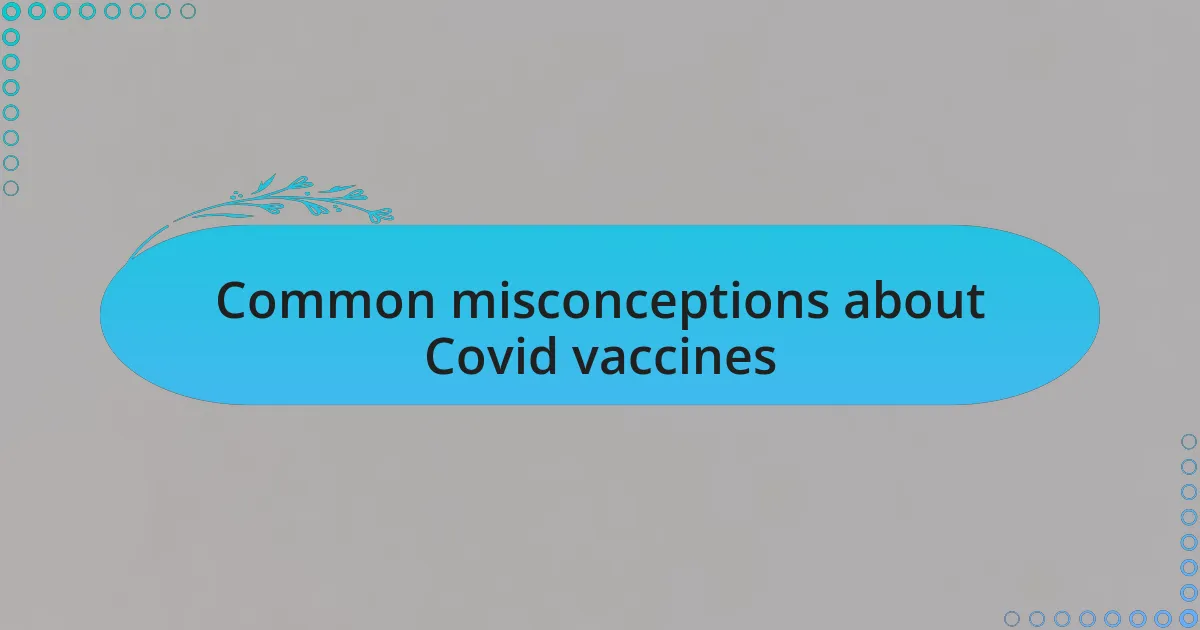
Common misconceptions about Covid vaccines
One common misconception about COVID vaccines is that they alter your DNA. I remember feeling a bit uneasy when I first encountered this theory, thinking it might be true. However, it’s essential to understand that mRNA vaccines work by teaching our cells how to make a harmless piece of the spike protein found on the virus, prompting our immune system to recognize it. This process does not change our DNA—it’s like a guide showing our body’s defenses how to react without any permanent changes.
Another widespread belief is that COVID vaccines contain microchips for tracking purposes. This concept initially struck me as odd and speculative. The truth is, vaccines are purely biological tools designed to stimulate immunity and protect our health, not technological devices with hidden agendas. I often found myself questioning the origins of these myths; why do people jump to such dramatic conclusions instead of trusting science?
I also noticed that some folks think severe side effects from the vaccine are common. When I first received my shot, I braced myself for the worst, recalling all the horror stories I’d heard. In reality, most side effects are mild and temporary, like soreness at the injection site or a low-grade fever. It’s a small trade-off for the protection we gain—similar to how I once felt after a tough workout: uncomfortable but ultimately rewarding. Understanding these misconceptions can empower us to make informed decisions about our health.
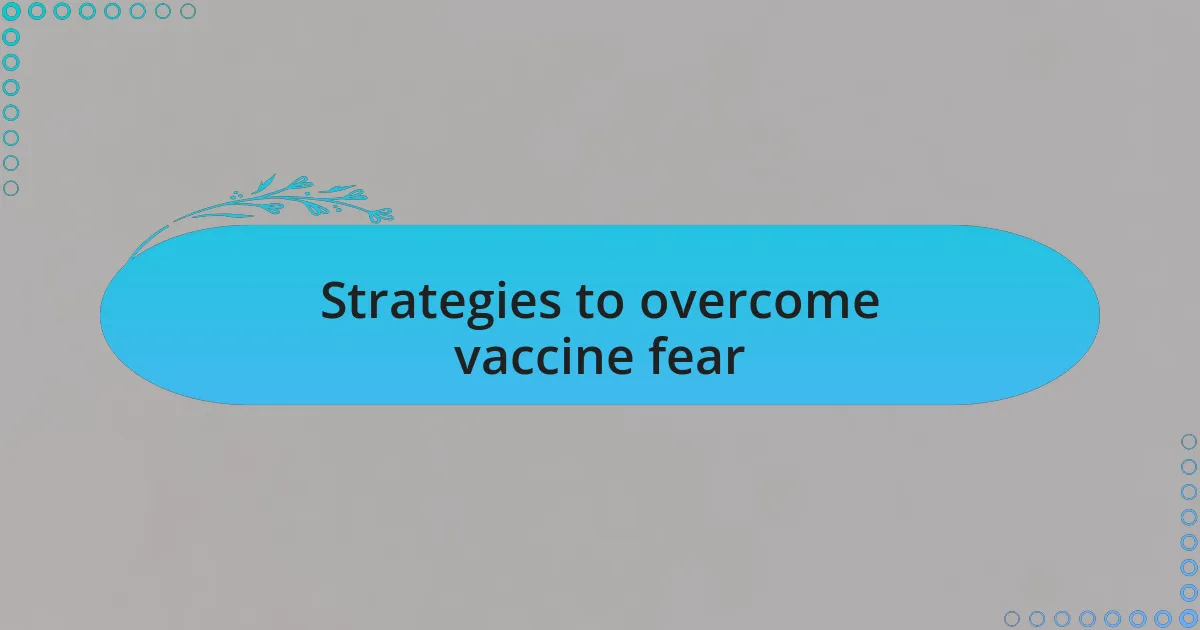
Strategies to overcome vaccine fear
A useful strategy I found was to educate myself about the vaccines. When I began reading reliable sources and talking to healthcare professionals, my fear started to lessen. Have you ever noticed how knowledge can often replace anxiety? I remember speaking with my doctor, who took the time to address my concerns. Just understanding how the vaccine works and what to expect made my apprehension feel more manageable.
Another approach I found helpful was to talk about my feelings with friends and family. Sharing my fears created a sense of community and support that I desperately needed. I realized that many others shared my anxiety, and it was comforting to know I wasn’t alone in this journey. Isn’t it interesting how opening up can lighten the emotional load? The act of voicing my concerns turned the experience into a collective one, making it less daunting.
Finally, I embraced relaxation techniques on the day of my vaccination. Before my appointment, I tried deep breathing exercises and visualization to calm my nerves. Imagine stepping into the vaccination center feeling serene and prepared rather than anxious. When I walked in, I focused on the positive outcome rather than the fear, and it truly made a difference. Have you ever tried using mental imagery to influence your mindset? For me, it transformed the entire experience into one of hope and empowerment.